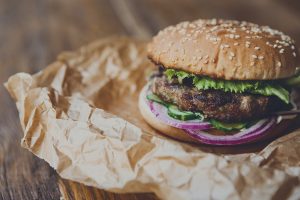A new study warns that packaging of fast food items contains carcinogens. Polyfluoroalkyl substances (PFASs) are highly persistent chemicals. These chemicals are associated with cancer. They have damaging effects on fetal growth and on the immune system. The reason the food industry is using them is to make food packaging grease-resistant. This is a desirable quality. But other research showed that PFASs can leach into foods, which your system subsequently ingests. CNN has recently reported about this study.
Think about this scenario. You are in a hurry to get a quick meal. A hamburger and French fries are your dream and you order it. There is no time for you to think that packaging of fast food items contains carcinogens. But this is exactly what a diverse team of specialists determined. They came from the Silent Spring Institute, Newton, MA and from California Department of Toxic Substances Control, Sacramento, CA. Others came from the Green Science Policy Institute, Berkeley, CA and the Department of Chemistry, University of California at Berkeley, Berkeley, CA. This is not the end. There are 5 more diverse departments that are part of the study and they are listed in this link.
The title of their research paper was: “Fluorinated Compounds in U.S. Fast Food Packaging”.
How are fluorinated compounds in food packaging materials measured?
The researchers measured fluorine in packaging material using particle-induced gamma-ray emission (PIGE) spectroscopy. This method allows measuring fluorine fast and effectively in solid materials like cup materials, wrapping paper, cardboard etc.
Findings’ showing that packaging of fast food contains carcinogens
Researchers collected 400 samples of food contact paper, paperboard containers and containers for beverages from fast food restaurants. These fast food businesses are all over the US. The researchers used the PIGE spectroscopy method to determine fluorine.
- First of all, the researchers found that 56% of dessert and bread wrappers contained more than 16 nmol/ cm² of fluorine. They analyzed the positive samples further with more sensitive methods for toxins. Using liquid chromatography/high-resolution mass spectrometry they detected perfluorocarboxylates, perfluorosulfonates, and other known PFASs. And they found other unidentified polyfluorinated compounds. All of these are toxic substances, which you don’t want to ingest.
- In addition 38% of sandwich and burger wrappers contained PFASs.
- Finally, 20% of paperboard containers that held French fries showed PFASs.
- The good news: none of the paper cups showed PFAS contamination.
What can you do to protect yourself when packaging of fast food items contains carcinogens?
In conclusion, when you go to a fast food place, it is very difficult to get away from exposure to these toxic PFASs. Consequently, your best plan of action is to avoid fast food places altogether. Buy food locally and prepare it at home. The fact that you eat fast foods is already a problem as it is of questionable quality, and the packaging just makes it worse! At home or in restaurants use ceramic plates to place your food on. Also, refrain from processed foods!
Conclusion
Fast foods are not the healthiest foods as they often contain too many cheap fats, too much salt, many food preservatives and chemicals. But the newest is that it seems like the wrapping that is used to present fast food to you is laced with carcinogens and other toxic chemicals. So be aware that packaging of fast food items contains carcinogens. Therefore your best defense is to do what I did since 2001: buy regular food from a grocery store or farmer’s market and prepare it at home. Also, eat from real porcelain plates with real cutlery. You reduce harmful chemicals in your body and you will remain healthier for longer.







